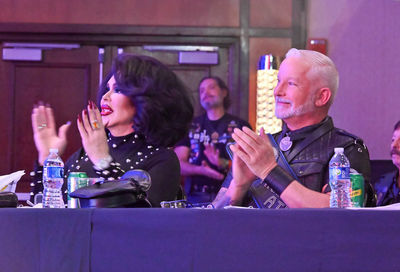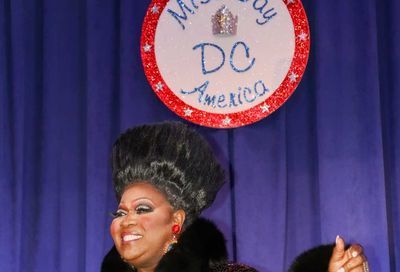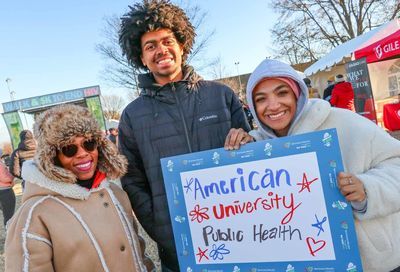Federal appeals court rules Virginia same-sex marriage ban unconstitutional

A federal appeals court found Virginia’s ban on same-sex marriage unconstitutional in a ruling handed down Monday.
With a 2-1 decision, the 4th Circuit Court of Appeals upheld a lower court’s ruling finding Virginia law prohibiting same-sex marriage and recognition of same-sex marriages performed in other states in violation of the Due Process and Equal Protection Clauses of the Fourteenth Amendment to the U.S. Constitution.
“We recognize that same-sex marriage makes some people deeply uncomfortable,” wrote Judge Henry Floyd for the majority. “However, inertia and apprehension are not legitimate bases for denying same-sex couples due process and equal protection of the laws. Civil marriage is one of the cornerstones of our way of life. It allows individuals to celebrate and publicly declare their intentions to form lifelong partnerships, which provide unparalleled intimacy, companionship, emotional support, and security. The choice of whether and whom to marry is an intensely personal decision that alters the course of an individual’s life. Denying same-sex couples this choice prohibits them from participating fully in our society, which is precisely the type of segregation that the Fourteenth Amendment cannot countenance.”
Floyd’s majority opinion was joined by Judge Roger Gregory. Floyd was first nominated to the federal bench by President George W. Bush in 2003 and nominated to serve on the appeals court by President Barack Obama in 2011. Dissenting was Judge Paul Niemeyer, who wrote that same-sex marriage is not subject to the same constitutional protections as the “traditional right to marry.”
“Because there is no fundamental right to same-sex marriage and there are rational reasons for not recognizing it, just as there are rational reasons for recognizing it, I conclude that we, in the Third Branch, must allow the States to enact legislation on the subject in accordance with their political processes,” Niemeyer continued. “The U.S. Constitution does not, in my judgment, restrict the States’ policy choices on this issue. If given the choice, some States will surely recognize same-sex marriage and some will surely not. But that is, to be sure, the beauty of federalism.”
In February, U.S. District Court Judge Arenda L. Wright Allen found Virginia’s constitutional amendment defining marriage as between a man and a woman and banning state recognition of legal same-sex marriages performed in other jurisdictions, as well as portions of Virginia code and “any other Virginia law that bars same-sex marriage or prohibits Virginia’s recognition of lawful same-sex marriages from other jurisdictions” as unconstitutional. The decision comes in the case of Bostic v. Schaefer, which was filed on behalf of two same-sex couples in July 2013 by the legal team that challenged California’s Proposition 8, including the American Foundation for Equal Rights (AFER) along with attorneys Ted Olson and David Boies. The American Civil Liberties Union (ACLU) and Lambda Legal joined the case in March on behalf of all of Virginia’s same-sex couples.
Monday’s decision does not go into effect for 21 days, unless a stay is requested. While the case could also be appealed to the U.S. Supreme Court, if the high court does not grant review the appeals court decision will be final. According to LGBT-rights groups, the decision could impact challenges to same-sex marriage bans in North Carolina, South Carolina and West Virginia, which fall in the jurisdiction of the 4th Circuit Court of Appeals.
UPDATE: Hours after the appeals court’s decision was issued, North Carolina Attorney General Roy Cooper (D) announced he would no longer defend the state’s same-sex marriage ban.
“[T]oday we know our law will almost surely be overturned as well,” Cooper said at a press conference. “Simply put, it’s time to stop making arguments we will lose and instead move forward knowing the ultimate resolution will likely come from the United States Supreme Court.”
According to Cooper, the attorney general’s office believes any judge who hears arguments in the four pending challenges to the state’s same-sex marriage ban will be bound to find the law unconstitutional by the decision issued by the 4th Circuit Court of Appeals. Cooper added that it would be a “futile gesture” for state lawmakers to hire outside attorneys to defend the state’s ban on same-sex marriage.
The appeals court’s decision also marks yet another victory for marriage equality in the year since the Supreme Court’s 5-4 decision in Windsor, which struck down the federal government’s definition of marriage as between a man and a woman. Since that decision, marriage equality has not lost a single day in court. Federal courts have ruled in favor of marriage equality in Utah, Ohio, Oklahoma, Kentucky, Idaho, Illinois, Indiana, Michigan, Pennsylvania, Tennessee, Texas, Virginia, Oregon, Wisconsin and Indiana. The 10th Circuit Court of Appeals reaffirmed lower courts’ rulings finding same-sex marriage bans in Utah and Oklahoma as unconstitutional as well. State courts in Arkansas, New Jersey, New Mexico, Colorado and Florida have also sided with marriage equality.
“So many states now have had federal courts declare their laws unconstitutional — an unbroken string of victories for marriage equality in federal courts is really remarkable,” Olson told reporters Monday. “In my lifetime, in the practice of law, which approaches 50 years now, I have never seen anything like it where an important constitutional issue has been decided again and again and again by federal courts throughout the United States in precisely the same way.”
Support Metro Weekly’s Journalism
These are challenging times for news organizations. And yet it’s crucial we stay active and provide vital resources and information to both our local readers and the world. So won’t you please take a moment and consider supporting Metro Weekly with a membership? For as little as $5 a month, you can help ensure Metro Weekly magazine and MetroWeekly.com remain free, viable resources as we provide the best, most diverse, culturally-resonant LGBTQ coverage in both the D.C. region and around the world. Memberships come with exclusive perks and discounts, your own personal digital delivery of each week’s magazine (and an archive), access to our Member's Lounge when it launches this fall, and exclusive members-only items like Metro Weekly Membership Mugs and Tote Bags! Check out all our membership levels here and please join us today!
























You must be logged in to post a comment.